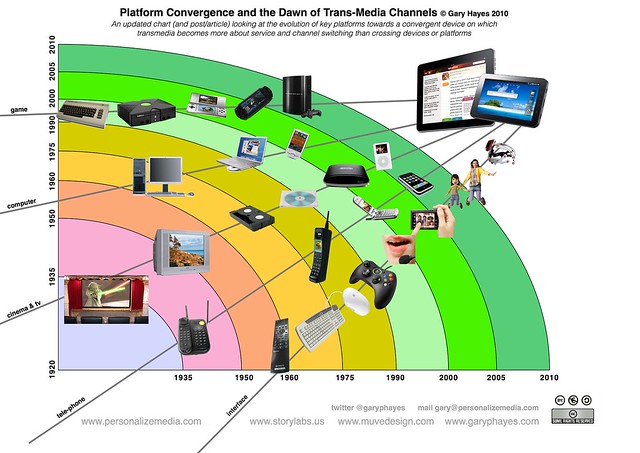
Technological Convergence
For much of modern history, the different types of media — books, newspapers, radio, television, cinema — were distinct technologies. They also existed in separate industries. Digitization, computer networking and the rise of the Internet, however, have resulted in the breaking down of these silos. This has led to the integration of all media. It enables the immediate and global exchange of every kind of content.
Advantages of Technological Convergence
Technological convergence simplifies the production of media content. It also expands, accelerates and facilitates its distribution, often with associated cost savings. A digital photograph, for example, can be shot and circulated globally within seconds via the Internet. There is no need for film processing, printing and physical distribution. Similarly, consumers can access multiple forms of media content on a single device whenever they choose, often for free. With technological convergence, the electronic transmission of data can be exponential. This replaces the more singular, physical transportation of material goods.
Convergence has also made it easier to produce media. Digitization allows consumers of media content to produce and distribute their own content. They could be everyday people using social media sites. Or they could be professionals (e.g., designers, filmmakers, musicians, writers, etc.) working in their field. Some analysts see this as a democratization of media. Anyone with access to digital media and a computer network can produce, consume and circulate media content.
Drawbacks of Technological Convergence
Our experience with convergence to date has also revealed some drawbacks. Not everyone has ready and affordable access to digital media, or the skills to employ them. A connection to computer networks (and the literacy required to navigate them) is increasingly vital. It creates a digital divide between haves and have-nots. Also, the tracking capacity of computer programs has resulted in increased surveillance. This has prompted concerns about personal privacy and security.
The rapid change of digital formats and the massive quantity of available data has led to challenges. These include concerns about the storage, preservation and protection of things deemed important to the public record. Digital content can be copied, changed and circulated with great ease. This presents a challenge to existing copyright law and makes it difficult to prevent the pirating of content. The music, film and television industries have been impacted by this. The publishing industries have also been threatened by the free circulation of media.
Economic Convergence
The economic strategy of media convergence (also known as media consolidation, media concentration or economic convergence) is a product of three elements. First, digitization. Second, corporate concentration. Fewer large companies own more media properties. (See also Royal Commission on Corporate Concentration). And third, government deregulation. These factors have allowed media conglomerates to own different kinds of media (e.g., TV and radio stations and newspapers) in the same markets. It also permits content carriage companies (e.g., cable and satellite TV distributors) to own content producers (e.g., specialty TV channels).
Converged Media Corporations in Canada
In Canada, Quebecor Inc. has become the champion of media convergence. It uses its media outlets to cross-promote the content it produces and distributes. Quebecor is active in newspaper, magazine and book publishing. It produces and distributes television content. It provides cable and wireless phone networks, Internet services, and music distribution and retailing. It even develops video games.
Bell Canada Enterprises (BCE) owns cable and mobile phone networks. It is involved in television production and distribution (CTV, TSN and the streaming service Crave), Internet services and advertising. It also holds partial stakes in Maple Leaf Sports & Entertainment (which owns the Toronto Maple Leafs, Toronto Raptors, Toronto FC and Toronto Argonauts) and the Montreal Canadiens.
Rogers Communications is Canada's largest wireless telephone carrier. It has interests in Internet services, television production and distribution, radio, and magazine publishing. It also owns the Toronto Blue Jays, whose games are broadcast on Rogers’ radio and TV networks. (See also: Rogers Buys Blue Jays.)
The Canadian Broadcasting Corporation (CBC) has also changed its profile. Once only a radio and television broadcaster, it is now a multi-platform media provider. It offers web services, mobile news and music applications. The CBC radio program q, for example, is broadcast on CBC Television. It also has its own web site and YouTube channel.
Advantages of Economic Convergence
Corporate convergence can be highly beneficial to companies. It allows them to reduce the costs of labour, materials and management. They can use the same media content across several media outlets. Advertisers can receive package deals for a number of media platforms. Brand recognition and loyalty can be improved through cross-promotion and cross-selling. Historically, communications companies have formed newspaper chains and networks of radio and TV stations to realize these same advantages. Convergence can be seen as the next step in this same logic.
Drawbacks of Economic Convergence
However, economic convergence also has potential drawbacks for society and the economy as a whole. Reduced competition can increase barriers to entry for new companies. The media can become more commercialized. People can be treated more as consumers than citizens. Also, corporate mergers can be very costly. Converged companies tend to seek profits through cost-cutting rather than investing more in services.
Corporate convergence also prompts concerns about the quality of corporate journalism. The role of the media to provide objective information and analysis comes under greater scrutiny. The independence of journalists comes into question, as does the range of viewpoints on current events. The coverage of local issues is reduced. Conflicts of interest between properties owned by the same company can arise.

 Share on Facebook
Share on Facebook Share on X
Share on X Share by Email
Share by Email Share on Google Classroom
Share on Google Classroom



